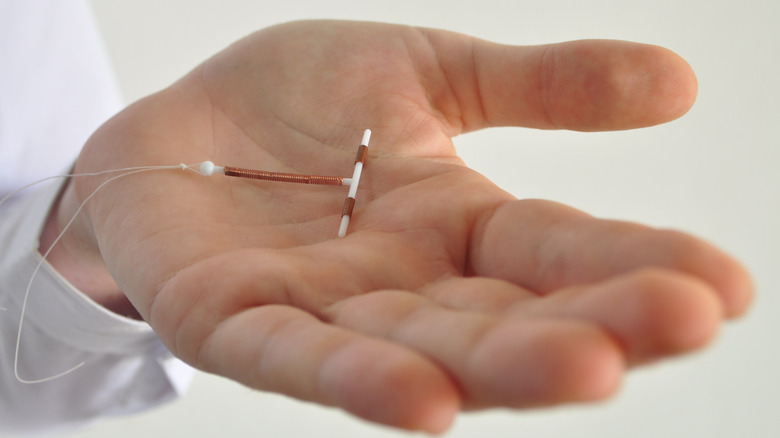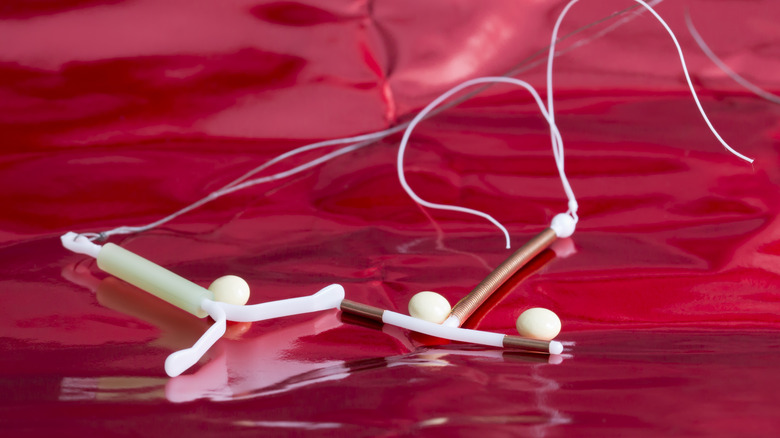Being Sedated For IUD Insertion Can Make All The Difference. Here's How To Ask
Even though it's 2023, it can feel as though there are too few choices when it comes to birth control. It's proven that the best way to prevent both unwanted pregnancy and the spread of STIs during sexual activity is to use "dual protection," or two forms of birth control. This would likely mean that you use a condom during sex to limit the risk of STI transmission, and then a type of female birth control that further reduces cthe hances of pregnancy.
After former President Trump was elected in 2016, it seemed like everyone was talking about IUDs. Because the president dictates who will be nominated to the Supreme Court, there was much concern that Roe v. Wade would be overturned and millions of women would lose bodily autonomy — and clearly, those concerns were warranted. Because IUDs and other birth control implants can prevent pregnancy with more than 99% efficiency, with some lasting up to 10 years, they became a popular option following the 2016 election because they could last through multiple presidential administrations.
Following the 2016 election, there was "an unprecedented surge in questions about access to health care and birth control, both online and in our health centers, and a nearly tenfold increase in appointments for IUDs," Elizabeth Clark, director of health media for Planned Parenthood Federation for America, told the New York Times in 2019. Yet despite the surge in popularity of IUDs, some people have been outspoken about the pain they cause.
Why you might want a sedation during IUD insertion — and how to ask for it
For some, the pain of inserting an IUD can be likened to menstrual cramps, but others have described it in terms that sound far more excruciating.
One TikTok user called it, "One of the most painful things I've ever done, and I've had two kids," while another said, "I'm literally terrified to get it removed — it was so painful getting it put in" (via Self). Writer Casey Johnston wrote in The Outline that she experienced "at least three huge, blinding waves" of pain during her insertion. Unfortunately, women have recounted experiences of not being told how painful IUD insertion is, or being given anything to numb the pain. "Nobody warned me it would hurt so much or offered any pain relief," one said.
But there's good news for those for whom the IUD feels like the best choice of birth control: You can simply ask the doctor if sedation via IV anesthesia prior to insertion is an option. Yep, that's it. While some OB-GYNs might not be eager to sedate their patients, OB-GYN Courtney Alexis Penn, told Slate, "Sedation is safe as long as your airway is being adequately monitored by the anesthesiologist." Although sedation during IUD insertion has its risk, that's true any time you're put under anesthesia. But if IUDs aren't for you, other birth control options remain available.
Other birth control options
When it comes to birth control, there's no one-size-fits-all approach. Other options beyond the IUD include birth control pills, birth control patches, birth control shots (via your arm), birth control rings (inserted into the vagina), and more. Birth control affects everyone a little differently, and should be chosen based on individual needs. "There are millions of different combinations of ways that a body could metabolize hormones," Dr. Madeline Deutsch, associate professor at the University of California, San Francisco, and also the director of UCSF Transgender Care, told NPR. "Because of this, everybody's response to hormones is going to be a little bit different."
First things first: Be sure to do your research, and know about the side effects of each. If you're still test-driving birth control options in order to pick the right one for you, it's important to also keep a notebook wherein you detail how the birth control method is affecting your mood, or anything else. And make sure you consult with your doctor, before, during, and after your selection process. "If you don't feel good when taking this, you should let me know immediately and we can try something else," Dr. Deutsch said.
While this can feel like an exhausting amount of work for women, there's some good news: We may be closer to a new, effective form of male birth control than ever, per NPR. It would make life a whole lot easier than experiencing multiple waves of pain (or even one).


